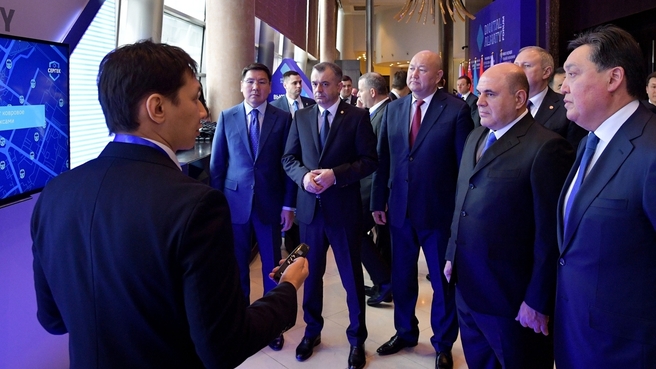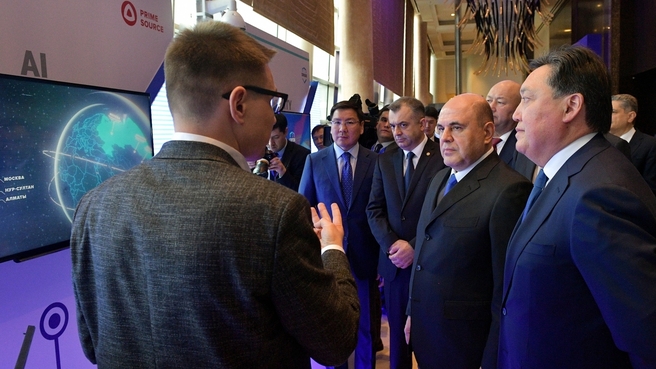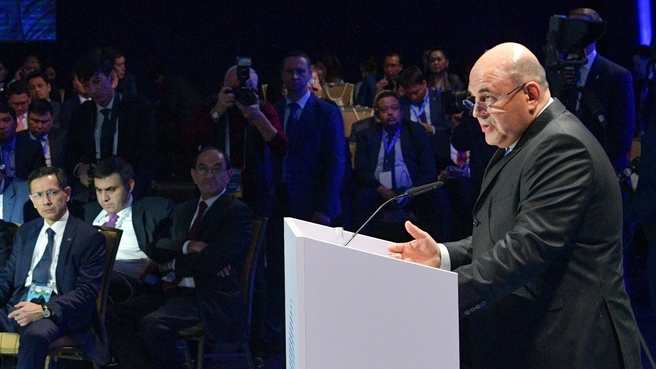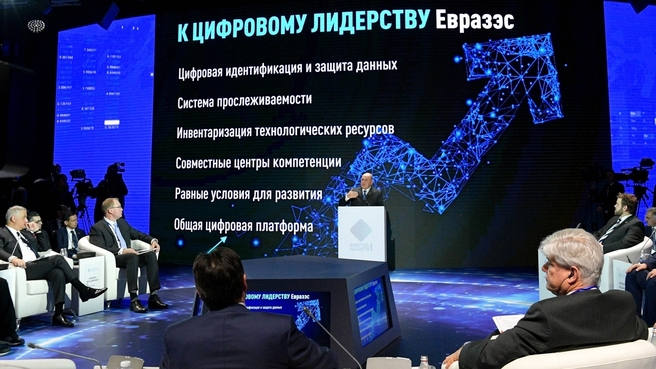The Prime Minister gave a speech at the plenary session of the forum titled: “Construction of a sustainable region based on big data and artificial intelligence”.
Before the plenary session, Mikhail Mishustin and the heads of delegations that took part in the forum visited an exhibition of IT companies and startup projects.
Mikhail Mishustin’s speech at the plenary session of the forum:
Forum participants, ladies and gentlemen,
To begin with I would like to thank our Kazakhstan colleagues for the splendid organisation of this forum, which is devoted to the global trends and key challenges of digitalisation. It took place for the first time two years ago in Almaty at the initiative of Nursultan Nazarbayev. During its short history, the forum has become an influential platform where we are currently discussing the prospects of a digital transformation and global economy, as well as the digital agenda of the EAEU.
I am quite certain that this gathering will help us better understand the importance of the influence of these matters on the sustainable social and economic development of the EAEU and it will facilitate the development of common answers to very serious challenges.
We have outlined these challenges in a short video, which I would like to show you.
(Playing a video clip)
The mankind has entered the digital stage of its development. The world still seems familiar, but digitalisation has impacted all spheres of our lives and its influence is growing.
Digitalisation is currently leading to the elimination of entire economy sectors together with production facilities and jobs. It is changing social behaviour of people, affecting labour and ownership relations. Finally, it is contributing to the tax base erosion and poses certain threats to the existence of regulators, including public and governmental institutions.
The term “economy of collaborative consumption” forms a new competitive environment where there is no place for intermediaries, while the relations between the seller and the buyer are often obscure for our regulating bodies. The business models of digital platforms are currently being built on the collection of global personal data, which allows for improving the content, service, attracts even more customers and quickly builds up capitalisation using breakthrough technology, including AI. At the same time, the owners of data are global, major digital companies while the product is not a service provided by these platforms, but the actual data itself. This leads to the elimination of money flows from these relations.
Digital businesses require a minimum number of tangible assets. Talent and knowledge, intellectual property, or if you prefer, non-tangible assets, are currently the most important. They can have a value enough to cross state borders. As a result, countries lose their rights to receive revenue from this value, which was created on their territories. Today many international institutions reconsider the processes of the distribution of the global revenue.
The digital transformation requires a total reinterpretation of the role of the state and the organisation of the activity of federal and other bodies of authority.
Russia has breakthrough technology for delivering on the most ambitious digital transformation objectives. We have our own leaders in digital business that create global ecosystems and develop fields which will change our world tomorrow.
For example, this includes self-driving cars.
At the same time, we not only possess state-of-the-art technologies, but we actively introduce them into everyday life. Over 100 million people here have registered for and use e-government services. An electronic document management system functions successfully, making it possible to exchange data between government agencies; our colleagues have noted this today. Our tax administration system offers an entire line of digital services that have already become part of our people’s lives and which are highly popular all over the world. Russia’s services and digital infrastructure development levels make it possible to discuss the possibility of establishing an integrated state digital platform. We are already doing this. Russia’s digital development will be aimed at integrating the lives of our people and companies into a digital ecosystem and providing them with convenient contactless services. At the same time, the state can feel confident that no one deceives it and that economic and social development is not hampered by administrative barriers.
Colleagues,
As a leader in the area of digital technologies, Russia is ready to share the most advanced innovations with its partners in the Eurasian Economic Union. We need a common agenda in this sphere because, as I have already said, the digital sector has become a key element of global competition, and we need to win, rather than just withstand, this global competition.
A common digital platform must reinforce the four freedoms shared within the EAEU: free movement of labour, capital, goods and services.
Visit
-
Mikhail Mishustin's meeting with first President of the Republic of Kazakhstan Nursultan Nazarbayev
-
Mikhail Mishustin's meeting with President of Kazakhstan Kassym-Jomart Tokayev
-
Mikhail Mishustin’s meeting with Prime Minister of Moldova Ion Chicu
-
Mikhail Mishustin’s meeting with Prime minister of Belarus Sergei Roumas
-
Mikhail Mishustin’s meeting with Prime Minister of Armenia Nikol Pashinyan
-
Mikhail Mishustin’s meeting with Prime Minister of Kazakhstan Askar Mamin
Much has already been accomplished. We jointly address the highly complicated problems of standardising the employment system, creating an ecosystem of digital transit corridors, a system for tracking and marking goods, facilitating electronic information exchanges on customs, taxation and banking matters, industrial co-production arrangements, data flows and protection and creating a system of regulatory sandboxes.
Moreover, we are working together to create a joint integrated information system.
As I said, digital transformation has become a key to global competition, and our countries need to set more ambitious tasks for creating better living conditions and an improved business environment in order to achieve leading positions. I will list them briefly.
First, we need to create a single digital identification system in our Union. Therefore, having a unified and secure system of online individual and corporate identities across the EAEU space will be a starting point for creating a common digital platform. Naturally, we should talk about accepting digital signatures all over the Union. We should seriously discuss this and adopt the relevant decisions.
Second, data protection is an essential element for any information system. All e-document flows must be contained within a universal interstate environment, operating under common standards, which must be agreed. Otherwise we will simply stop recognising each other, and cross-digitalisation systems will stop working in the near future. And this is fraught with disintegration.
Third,
We need to continue our efforts to develop a system for ensuring documentary and physical traceability of goods and services. It must be based on a common digital platform. Much has already been accomplished for this purpose.
Fourth, we need to review all of our technology resources and capabilities and open joint technology competence centres in order to drive EAEU’s digital development. You see, the Eurasian Economic Union still lacks its own software, processors and its own digital security system. And, of course, we need to create favourable conditions that would allow our talented people to create and expand digital startups on the Union territory. Today, we have seen some absolutely wonderful startups and ideas at the exhibition.
In conclusion, I would like to show you one more video. This is our vision of our taxpayers’ future. It is very important that today our young people don’t want to spend their time reading complicated instructions, filling out declarations, and they don’t want to go anywhere and register. In effect, this future is already here. How should we work with them? What can we do to make sure our governments receive the appropriate share of the added value, so our people understand the taxes they are paying, and online transactions make it possible to merge with the ecosystem of taxpayers’ life? We have such an example, namely, the contactless tax administration system that we have created for self-employed individuals. The mobile app allows them to register in the Russian Federation’s tax system in just a few minutes and not to spend any extra time on interaction with the state.
(Showing the video)
I hope that we will jointly find the answers to all digitalisation challenges and will build our Union with the most sophisticated information technologies that will create a better life for our people.
***
Following the forum’s plenary session, the Prime Minister took part in the Digital Almaty Awards ceremony.












